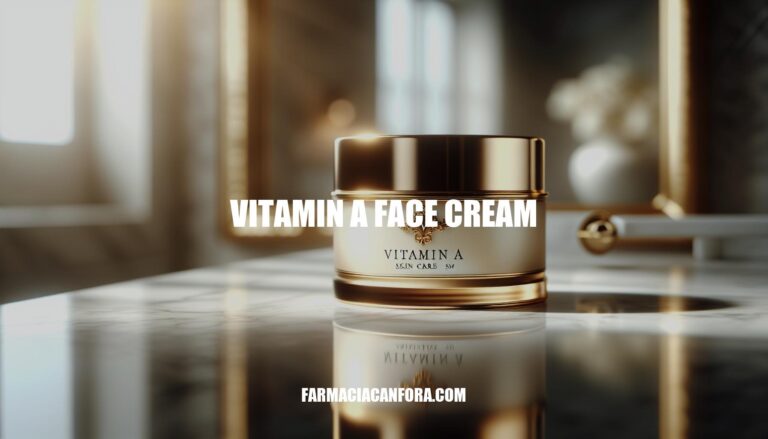


Vitamin A face creams, often known as retinoids, are a popular skincare product renowned for their anti-aging and skin-renewing properties. These creams help reduce the appearance of fine lines and wrinkles by stimulating collagen production, improve skin texture and tone by promoting cell turnover, and address issues like acne and hyperpigmentation. Incorporating a vitamin A face cream into your skincare routine can lead to a healthier, more youthful complexion.
Here are the specific benefits of using a vitamin A face cream:
Reducing Wrinkles: Vitamin A stimulates collagen production, which helps to minimize fine lines and wrinkles. It also improves skin elasticity by removing damaged elastin fibers.
Improving Skin Texture: Retinoids, a form of vitamin A, promote skin cell turnover, leading to smoother skin texture. They help to even out skin tone and reduce the appearance of age spots and sunspots.
Treating Acne: Vitamin A helps to exfoliate the skin, removing dead skin cells and unclogging pores. This reduces the formation of pimples and can also help diminish acne scars by stimulating collagen and elastin production.
Vitamin A face creams, often containing retinoids like retinol, work by penetrating the skin and reaching the dermis. Here, they promote cell turnover by encouraging the shedding of old skin cells and stimulating the production of new, healthier cells. This process helps improve skin texture and tone.
Additionally, retinoids boost collagen production by stimulating fibroblasts, the cells responsible for collagen synthesis. This leads to firmer skin and a reduction in the appearance of fine lines and wrinkles.
Skin Type:
Concentration of Active Ingredients:
Additional Components:
Here are some practical tips for applying vitamin A face cream:
Precautions:
This routine should help you get the benefits of vitamin A while minimizing irritation.
Using vitamin A face cream can lead to several side effects, including:
Dryness and Peeling: Vitamin A can accelerate skin cell turnover, which may cause dryness and peeling. To mitigate this, start with a lower concentration and gradually increase it. Also, use a good moisturizer to keep your skin hydrated.
Redness and Irritation: The potent nature of vitamin A can cause redness and irritation, especially for sensitive skin. To reduce this, apply the cream every other night initially and slowly build up to nightly use. Pairing it with soothing ingredients like hyaluronic acid can also help.
Increased Sensitivity to Sunlight: Vitamin A can make your skin more sensitive to UV light, increasing the risk of sunburn. Always use a broad-spectrum sunscreen during the day to protect your skin.
Eczema Flare-ups: For those with eczema, vitamin A can sometimes exacerbate the condition. It’s best to consult with a dermatologist before starting any new skincare regimen.
By taking these precautions, you can enjoy the benefits of vitamin A while minimizing its side effects.
Vitamin A face creams, also known as retinoids, are a popular skincare product that offers numerous benefits for anti-aging and skin renewal. They help reduce fine lines and wrinkles by stimulating collagen production, improve skin texture and tone by promoting cell turnover, and address issues like acne and hyperpigmentation.
When selecting the best vitamin A face cream, consider your skin type, concentration of active ingredients, and additional components such as hydrating ingredients, soothing agents, and antioxidants. This will help you find a product that suits your specific needs and minimizes potential side effects.
To apply the cream effectively, follow these steps:
Be aware of potential side effects like dryness, redness, increased sensitivity to sunlight, and eczema flare-ups. If you experience any of these issues, consider reducing the frequency of use or consulting a dermatologist for guidance.